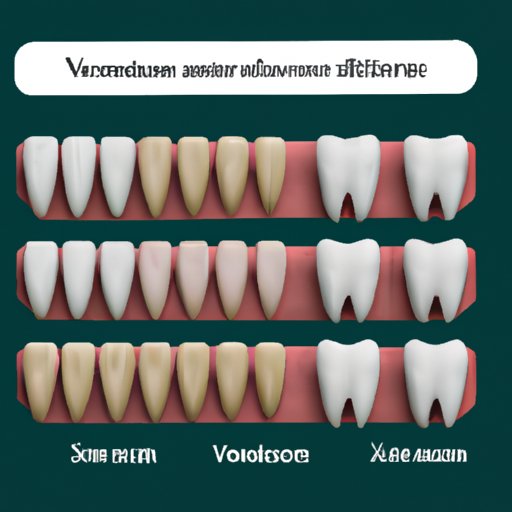Introduction
Veneers are thin shells made from porcelain or composite resin that are designed to cover the front surface of your teeth. They can be used to improve the appearance of your teeth, as well as to protect them from further damage. Getting a full set of veneers can be an expensive investment, so it is important to understand what factors influence the cost and to be aware of all the different options available.

A Comprehensive Guide to Full Veneer Costs
The cost of a full set of veneers depends on several factors, including the type of veneers chosen, the number of teeth being treated, and the location of the dentist. The following sections explore these factors in more detail.
Factors that Affect the Cost of Veneers
The type of veneers used will have a major impact on the overall cost. Porcelain veneers tend to be more expensive than composite veneers, but they also last longer and are more resistant to staining. Additionally, the number of teeth being treated can affect the cost; treating a full upper arch will typically cost more than treating just one tooth.
Different Types of Veneers and Their Costs
Porcelain veneers are the most popular type of veneers, and they typically range in price from $900 to $2,500 per tooth. Composite veneers generally cost between $250 and $1,500 per tooth. It is important to note that the cost of veneers may vary widely depending on the dentist and the region. For example, veneers in New York City may cost significantly more than veneers in a rural area.
Additional Fees Associated With Getting Full Sets of Veneers
In addition to the cost of the veneers themselves, there are other fees associated with getting a full set of veneers. These fees may include the cost of x-rays, impressions, and anesthesia, as well as the cost of any additional procedures that may be necessary to prepare the teeth for veneers. Additionally, many dentists charge a fee for the initial consultation.

What You Need to Know About the Cost of Veneers
Understanding the Different Components of a Full Set of Veneers
When considering the cost of a full set of veneers, it is important to keep in mind that there are several components involved. The cost of the veneers themselves is only part of the equation; other factors, such as the cost of preparation and additional procedures, should also be taken into account. It is also important to note that some insurance plans may cover some of the costs associated with getting a full set of veneers.
Exploring the Pros and Cons of Getting Full Veneers
Getting a full set of veneers has both advantages and disadvantages. On one hand, veneers can improve the appearance of your teeth and can help protect them from further damage. On the other hand, veneers are not reversible and may require periodic maintenance. According to Dr. William Dorfman, a leading cosmetic dentist, “Patients should consider the long-term benefits of veneers versus the short-term costs.”
Breaking Down the Cost of a Full Set of Veneers
Determining the Average Cost of a Full Set of Veneers
The average cost of a full set of veneers ranges from $7,500 to $15,000. This amount includes the cost of the veneers themselves, as well as the cost of preparation and additional procedures. Some insurance plans may cover some of these costs, so it is important to check with your provider before making any decisions.
Comparing Costs Between Different Types of Veneers
Porcelain veneers tend to be more expensive than composite veneers, but they also last longer and are more resistant to staining. Additionally, the number of teeth being treated can affect the cost; treating a full upper arch will typically cost more than treating just one tooth.
Conclusion
Getting a full set of veneers can be an expensive investment, but it can also have many long-term benefits. Understanding the different components of a full set of veneers and exploring the pros and cons of getting full veneers is essential for making an informed decision. The average cost of a full set of veneers ranges from $7,500 to $15,000, though this amount may vary depending on the type of veneers chosen and the number of teeth being treated.
(Note: Is this article not meeting your expectations? Do you have knowledge or insights to share? Unlock new opportunities and expand your reach by joining our authors team. Click Registration to join us and share your expertise with our readers.)
